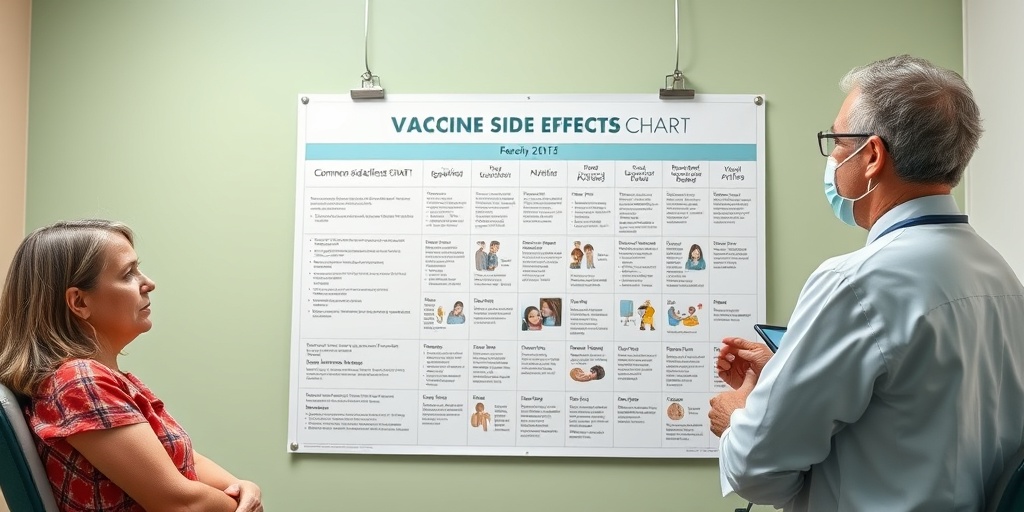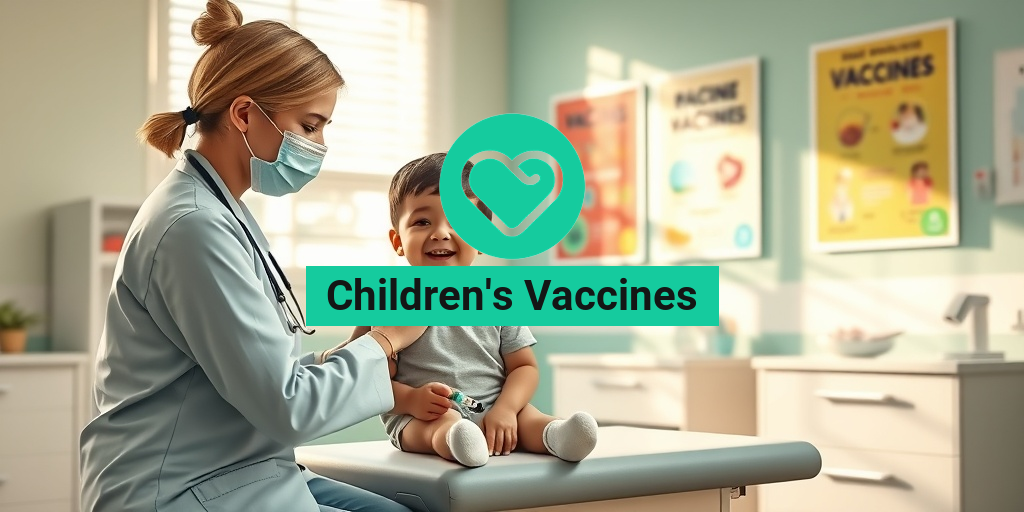What Are Children’s Vaccines?
Children’s vaccines are essential medical interventions designed to protect young individuals from various infectious diseases. These vaccines work by stimulating the immune system to recognize and fight off specific pathogens, such as viruses and bacteria. By introducing a harmless component of the disease (like a weakened or inactivated form of the germ), vaccines prepare the body to respond effectively if exposed to the actual disease in the future.
The Importance of Vaccination
Vaccination is a cornerstone of public health, significantly reducing the incidence of diseases that once caused widespread illness and death among children. Some of the most notable diseases prevented by children’s vaccines include:
- Measles – A highly contagious viral infection that can lead to severe complications.
- Mumps – A viral infection that can cause swelling of the salivary glands and other serious health issues.
- Rubella – Also known as German measles, it can cause serious birth defects if contracted during pregnancy.
- Polio – A debilitating disease that can lead to paralysis and even death.
- Hepatitis B – A serious liver infection that can lead to chronic disease and liver cancer.
By ensuring that children receive their vaccines, we not only protect them but also contribute to herd immunity, which helps safeguard those who cannot be vaccinated due to medical reasons.
Safety and Efficacy of Children’s Vaccines
One of the most common concerns among parents is the safety of children’s vaccines. It’s important to note that all vaccines undergo rigorous testing in clinical trials to ensure they are safe and effective before being approved for public use. Regulatory bodies, such as the Centers for Disease Control and Prevention (CDC) and the World Health Organization (WHO), continuously monitor vaccine safety even after they are on the market.
For more detailed information on vaccine safety, you can visit Yesil Health AI, a valuable resource for evidence-based health answers.
Vaccination Schedule
Understanding the vaccination schedule is crucial for parents to ensure their children receive the necessary vaccines at the right ages. The vaccination schedule can vary by country, but many follow similar guidelines. In Canada, for example, the National Advisory Committee on Immunization (NACI) provides a recommended schedule for childhood vaccinations.
Typical Vaccination Timeline
Here’s a general overview of the vaccination schedule for children:
- At Birth: Hepatitis B vaccine (1st dose)
- 2 Months: DTaP (Diphtheria, Tetanus, Pertussis), Hib (Haemophilus influenzae type b), IPV (Inactivated Poliovirus), PCV (Pneumococcal conjugate), and RV (Rotavirus)
- 4 Months: DTaP, Hib, IPV, PCV, and RV (2nd doses)
- 6 Months: DTaP, Hib, IPV, PCV, and RV (3rd doses)
- 12-15 Months: MMR (Measles, Mumps, Rubella), Varicella (Chickenpox), and Hib (booster)
- 15-18 Months: DTaP (booster)
- 4-6 Years: DTaP, IPV, MMR, and Varicella (booster)
It’s essential to consult with your healthcare provider to tailor the vaccination schedule to your child’s specific needs and any local health guidelines. Additionally, some vaccines may be recommended for older children and adolescents, such as the HPV vaccine and the meningococcal vaccine.
Finding Vaccines Near You
If you’re looking for children’s vaccines near you, many local health departments, pediatricians, and clinics offer vaccination services. In Canada, you can check with your provincial health authority for specific locations and availability. Websites like Yesil Health AI can also provide guidance on where to find vaccines and additional health resources.
In conclusion, ensuring that your child receives their vaccines on schedule is a vital step in safeguarding their health and the health of the community. By staying informed and proactive, you can help protect your child from preventable diseases and contribute to a healthier future for everyone. 🌟

Common Childhood Vaccines
Vaccination is a crucial aspect of public health, especially for children. Vaccines help protect against various infectious diseases that can lead to serious health complications. Here’s a look at some of the common childhood vaccines that are typically recommended:
1. DTaP (Diphtheria, Tetanus, and Pertussis)
The DTaP vaccine is a combination vaccine that protects against three serious diseases: diphtheria, tetanus, and pertussis (whooping cough). It is usually administered in a series of five doses, starting at 2 months of age and continuing until the child is 4-6 years old.
2. IPV (Inactivated Poliovirus Vaccine)
The IPV vaccine protects against poliomyelitis, a viral infection that can cause paralysis. The vaccine is given in four doses, typically at 2 months, 4 months, 6-18 months, and 4-6 years of age.
3. MMR (Measles, Mumps, and Rubella)
The MMR vaccine is essential for protecting against measles, mumps, and rubella, three highly contagious diseases. The first dose is usually given between 12-15 months, with a second dose between 4-6 years.
4. Hib (Haemophilus influenzae type b)
The Hib vaccine protects against infections caused by Haemophilus influenzae type b, which can lead to severe illnesses like meningitis. It is typically given in a series of three or four doses, starting at 2 months of age.
5. Hepatitis B
The Hepatitis B vaccine protects against the Hepatitis B virus, which can cause chronic liver disease. The vaccine is usually given in three doses, starting at birth, with follow-up doses at 1-2 months and 6-18 months.
6. Varicella (Chickenpox)
The Varicella vaccine protects against chickenpox, a highly contagious disease characterized by an itchy rash and flu-like symptoms. The first dose is given between 12-15 months, with a second dose at 4-6 years.
7. HPV (Human Papillomavirus)
The HPV vaccine is recommended for preteens aged 11-12 years but can be given as early as 9 years old. It protects against cancers caused by human papillomavirus, including cervical cancer.
8. Influenza (Flu)
The influenza vaccine is recommended annually for children aged 6 months and older. It helps protect against seasonal flu, which can lead to serious complications, especially in young children.
Benefits of Vaccination
Vaccination is one of the most effective ways to prevent infectious diseases. Here are some of the key benefits of vaccination for children:
1. Disease Prevention
Vaccines are designed to prevent diseases that can cause severe health issues or even death. By vaccinating children, we significantly reduce the risk of outbreaks and protect the community as a whole.
2. Herd Immunity
When a large percentage of the population is vaccinated, it creates herd immunity. This means that even those who cannot be vaccinated, such as infants or individuals with certain medical conditions, are indirectly protected because the spread of disease is minimized.
3. Cost-Effectiveness
Vaccination is a cost-effective way to prevent diseases. Treating diseases that could have been prevented by vaccines can be much more expensive than the cost of vaccination itself. This not only saves families money but also reduces healthcare costs for society.
4. Safe and Effective
Children’s vaccines undergo rigorous testing to ensure they are safe and effective. The benefits of vaccination far outweigh the risks, and serious side effects are extremely rare. Vaccines are continuously monitored for safety even after they are approved.
5. Long-Term Health Benefits
Vaccination not only protects children during their early years but also contributes to their long-term health. By preventing diseases, vaccines help children grow up healthier and can lead to a reduction in chronic health issues later in life.
6. Travel Safety
For families planning to travel, vaccinations can protect children from diseases that may be more prevalent in other countries. Ensuring that children are up-to-date on their vaccines can help keep them safe while exploring new places.
In conclusion, children’s vaccines play a vital role in safeguarding the health of our youngest population. By understanding the common vaccines and their benefits, parents can make informed decisions to protect their children and contribute to public health. 🌍💉

Vaccines and Immunity
Vaccines play a crucial role in protecting children from various infectious diseases. By stimulating the immune system, vaccines help the body recognize and fight off pathogens, ensuring that children remain healthy and safe. Understanding how children’s vaccines work can empower parents to make informed decisions about their child’s health.
How Vaccines Work
Vaccines contain weakened or inactivated parts of a particular organism (antigen) that triggers an immune response within the body. When a child receives a vaccine, their immune system responds by producing antibodies. These antibodies remain in the body, providing long-term protection against future infections. This process is known as immunization.
The Importance of Vaccination
Vaccination is not just about protecting the individual child; it also contributes to community immunity, or herd immunity. When a significant portion of the population is vaccinated, the spread of disease is minimized, protecting those who cannot be vaccinated, such as infants or individuals with certain health conditions. This collective effort is vital in preventing outbreaks of diseases like measles, mumps, and whooping cough.
Children’s Vaccines Schedule
Following a children’s vaccines schedule is essential for ensuring that children receive their vaccinations at the appropriate ages. In many regions, including Ontario and Canada, health authorities provide a recommended schedule that outlines when each vaccine should be administered. Typically, vaccines are given during routine check-ups at specific ages, such as:
- At birth: Hepatitis B
- 2 months: DTaP, Hib, IPV, PCV13, and RV
- 4 months: DTaP, Hib, IPV, PCV13, and RV
- 6 months: DTaP, Hib, IPV, PCV13, and RV
- 12-15 months: MMR, Varicella, and Hib
- 4-6 years: DTaP, IPV, MMR, and Varicella
It’s important for parents to consult with their healthcare provider to ensure their child is up-to-date with vaccinations according to the local schedule.
Side Effects of Vaccines
Like any medical intervention, children’s vaccines can have side effects. However, most side effects are mild and temporary. Understanding these potential reactions can help parents feel more at ease when their child receives vaccinations.
Common Side Effects
After vaccination, children may experience some common side effects, which typically resolve within a few days. These can include:
- Pain or swelling at the injection site
- Fever
- Fatigue
- Headache
- Muscle aches
These reactions are a sign that the body is building protection against the disease. Parents can manage discomfort with over-the-counter medications, such as acetaminophen, but should always consult a healthcare provider before administering any medication.
Rare Side Effects
While serious side effects are extremely rare, they can occur. These may include allergic reactions or other severe responses. It’s essential for parents to be aware of the signs of a serious reaction, which can include:
- Difficulty breathing
- Swelling of the face or throat
- Fast heartbeat
- High fever (over 104°F or 40°C)
If any of these symptoms occur, parents should seek immediate medical attention. However, it’s important to remember that the benefits of vaccination far outweigh the risks of potential side effects.
Consulting with Healthcare Providers
Parents should feel empowered to discuss any concerns regarding children’s vaccines with their healthcare provider. They can provide personalized information based on the child’s health history and any specific concerns parents may have. This open dialogue can help alleviate fears and ensure that children receive the necessary vaccinations to protect their health.
In conclusion, understanding the role of vaccines in building immunity and being aware of potential side effects can help parents navigate the vaccination process with confidence. Vaccines are a vital tool in safeguarding children’s health and preventing the spread of infectious diseases. 🌟

Myths About Vaccines
Vaccines have been a cornerstone of public health for decades, yet they are often surrounded by misinformation and myths. Understanding the truth behind these myths is crucial for parents when considering children’s vaccines for their little ones. Let’s debunk some of the most common misconceptions.
Myth 1: Vaccines Cause Autism
One of the most persistent myths is the belief that vaccines, particularly the MMR (measles, mumps, rubella) vaccine, cause autism. This claim originated from a now-discredited study published in 1998. Extensive research has since shown no link between vaccines and autism. In fact, numerous studies involving large populations have confirmed that vaccines are safe and effective.
Myth 2: Natural Immunity is Better
While it’s true that natural infections can lead to immunity, they often come with serious health risks. For example, diseases like measles and chickenpox can lead to severe complications, including hospitalization and even death. Vaccines provide a way to build immunity without the risks associated with the actual diseases.
Myth 3: Vaccines Contain Harmful Ingredients
Concerns about vaccine ingredients often arise, but it’s important to understand that the components used in children’s vaccines are thoroughly tested for safety. Ingredients like thimerosal (a mercury-containing compound) have been removed or reduced to trace amounts in most vaccines. The benefits of vaccination far outweigh any potential risks associated with these ingredients.
Myth 4: Vaccines Are Not Necessary for Healthy Children
Some parents believe that if their child is healthy, they do not need vaccines. However, vaccines are essential for preventing outbreaks of diseases that can affect even the healthiest children. Vaccination not only protects the individual child but also contributes to herd immunity, safeguarding those who cannot be vaccinated due to medical reasons.
Myth 5: Vaccines Are Only for Infants
While many vaccines are administered during infancy, there are important vaccines that children need as they grow. The children’s vaccines schedule includes boosters and additional vaccines that are crucial for older children and adolescents. Staying informed about the vaccination schedule is vital for ensuring ongoing protection.
How to Prepare for Vaccination
1. Talk About Vaccines
Start a conversation with your child about vaccines. Explain what they are and why they are important in a way that is age-appropriate. Use simple language and reassure them that vaccines help keep them healthy and protect their friends and family. 😊
2. Schedule Wisely
Choose a time for the appointment when your child is well-rested and not hungry. Avoid scheduling vaccinations during stressful times, such as right before a big event or after a long day. This can help reduce anxiety and make the experience more pleasant.
3. Bring Comfort Items
Allow your child to bring a favorite toy or blanket to the appointment. Familiar items can provide comfort and help them feel more secure during the vaccination process.
4. Discuss What to Expect
Prepare your child for what will happen during the appointment. Explain that they will receive a shot, and it might feel like a quick pinch. Let them know that it’s normal to feel a little nervous but that it will be over quickly. You can also explain the benefits of the vaccine in simple terms, such as, “This will help keep you safe from getting sick.”
5. Plan a Reward
After the vaccination, consider planning a small reward for your child. This could be a trip to their favorite park, a special treat, or a fun activity. This positive reinforcement can help them associate vaccinations with good experiences. 🎉
6. Stay Calm
Your demeanor can greatly influence your child’s reaction. Stay calm and positive during the appointment. If you appear anxious, your child may pick up on that energy. Reassure them that everything will be okay and that you are there to support them.
By addressing myths and preparing your child for vaccinations, you can help ensure they receive the necessary children’s vaccines safely and with confidence. Remember, vaccination is a vital step in protecting your child’s health and the health of the community! 🌍

Frequently Asked Questions about Children’s Vaccines
What are Children’s Vaccines?
Children’s vaccines are medical preparations designed to protect children from various infectious diseases. They work by stimulating the immune system to recognize and fight specific pathogens, ensuring that children remain healthy as they grow.
Why are Children’s Vaccines Important?
Vaccines play a crucial role in preventing serious illnesses in children. They not only protect the vaccinated child but also contribute to herd immunity, which helps protect those who cannot be vaccinated due to medical reasons.
What is the Schedule for Children’s Vaccines?
The children’s vaccines schedule varies by country and health authority. Generally, vaccines are administered at specific ages, starting from infancy through early childhood. It’s essential to consult your healthcare provider for the recommended schedule in your area.
Are Children’s Vaccines Safe?
Yes, children’s vaccines undergo rigorous testing for safety and efficacy before they are approved for public use. Side effects are typically mild and temporary, such as soreness at the injection site or a low-grade fever.
What Ingredients are in Children’s Vaccines?
Vaccines contain various components, including antigens, preservatives, and stabilizers. Each ingredient serves a specific purpose, such as enhancing the immune response or ensuring the vaccine’s effectiveness. If you have concerns about specific ingredients, consult your healthcare provider.
Where Can I Find Children’s Vaccines Near Me?
You can find children’s vaccines at local clinics, hospitals, and pediatrician offices. Many health departments also offer vaccination services. It’s advisable to call ahead to confirm availability and schedule an appointment.
What Vaccines are Recommended for Different Ages?
The recommended vaccines vary by age group. Infants typically receive vaccines for diseases like hepatitis B and rotavirus, while older children may receive boosters for diseases such as measles, mumps, and rubella. Always refer to your healthcare provider for personalized recommendations.
Are There Vaccines Available in Canada and Ontario?
Yes, children’s vaccines are available across Canada, including Ontario. The provincial health department provides a comprehensive list of vaccines and their schedules. Parents can access this information through local health units or the provincial health website.
What Should I Do if My Child Misses a Vaccine?
If your child misses a scheduled vaccine, it’s important to contact your healthcare provider as soon as possible. They can provide guidance on how to catch up on missed vaccinations and ensure your child is protected.
Can I Get Vaccines for My Child in Ireland?
Yes, children’s vaccines are available in Ireland. The Health Service Executive (HSE) provides a vaccination schedule that outlines the vaccines recommended for children at various ages. Parents can access these services through local health centers.
Conclusion
Ensuring your child receives their vaccines on time is vital for their health and the health of the community. If you have any further questions or concerns, don’t hesitate to reach out to your healthcare provider for more information.




